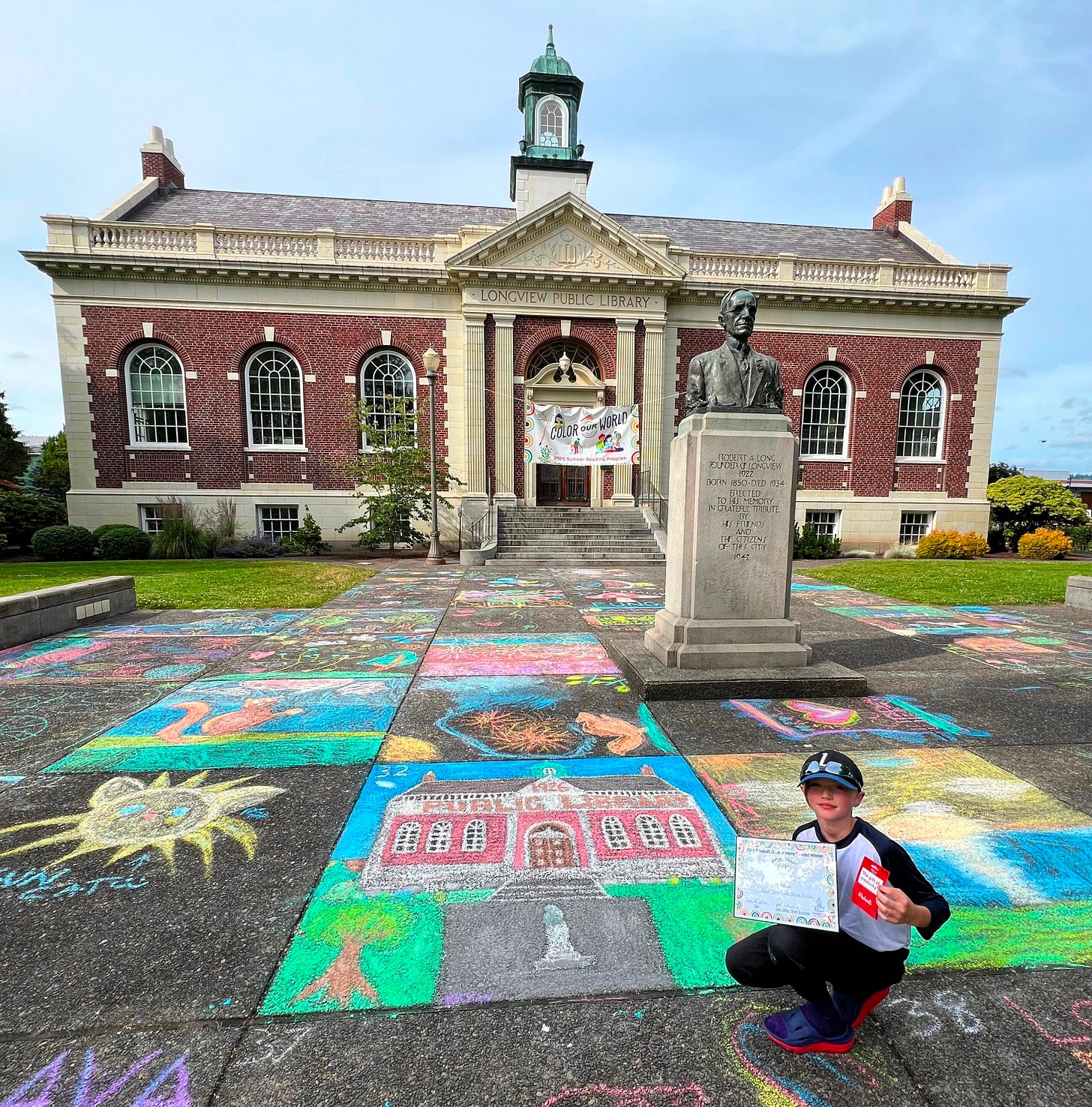Sinkings and sailings
A precocious child's drawing and appreciation of the Longview Library; a win for government secrecy; MGP on congressional mental declines; and the road to the volcano
Ten-year-old Kasen Korsmo Mowery wants to become a Navy pilot or a geologist.
He might want to add artist or architect to his list.
The precocious Longview 5th grader last Saturday won a prize for his detailed chalk drawing in the “Color Our World” art contest sponsored by the Longview Public Library’s summer reading program.
His subject: The library itself.
This was no simple line drawing with colors zigzagged and blocked in. Kasen rendered hundreds of red bricks individually. The quoins ( the library’s staggered mortared corners), parapet (the colonnade-like railing at the roof line), arched Palladian windows, and crowning cupola were drawn with remarkable proportion.
The sketch included a garden and the bust of Longview founder R.A. Long in the library plaza, where Kasen and other contestants did their work.

“We just happened to be there at the library and saw the contest and signed up. He was trying to think of what to draw and brainstorming and thinking about the categories they had,” said Kaden’s mom, Melissa Korsmo Mowery. “He glanced up and saw the library and thought, the library would be great. It represents Longview and is a great resource to be able to look up at.”
The drawing took about two hours. Kasen insisted that the sketch include details of the building and library grounds, his mom said.
He won the judge’s choice award, a gift certificate to Michael’s and a certificate from the library.
Kasen said he chose to draw the library for reasons he listed carefully: “One, I thought it would have a better chance of winning. Two, it would be better and I would be happy and proud of what I made.”
He also appreciates that “the library is open for everybody. You don’t have to pay to get a library card and (you can) check out books whenever you want and they have activities like book club that are fun.”
Kasen said he occasionally draws houses and other subjects in a sketch book, but his favorite subjects at Three Rivers Christian School are math, science and history.
Kasen’s mom helped fill in some of the colors, but the concept and care for detail were Kasen’s, she said. For Kasen, the experience itself was reward enough even if he had not won a certificate.
“I really won because I got to do an event with my mom.”
Another blow to the cause of open government
The state Supreme Court just struck a blow to government transparency and the state’s Open Records Act in a late June ruling.
The state’s high court ruled that collective bargaining agreements between the state and its employee unions are exempt from public disclosure until AFTER the Legislature agrees to fund them.
In effect, the justices adopted the state’s argument that labor agreements don’t become public until they are funded by an appropriations bill enacted into law, even if the unions and the agencies involved have agreed to them.
The ruling in Citizen Fund vs. Washington Office of Financial Management essentially shields major spending decisions from the public until after they are made.
State employee salaries and benefits are a significant share of state spending, although they fell from 21%s of the state budget in 2008 to less than 17% by the end of the last decade, according to the state figures. (I could not immediately find more current numbers.) Collective bargaining agreements are major spending decisions, which the court says can be made completely in secret.
At issue was an exemption in the Public Records Act that shields labor negotiations during the deliberative process. The state argued that the exemption is necessary to “protect the public sector collective bargaining process from public scrutiny and politicization that would hinder the exchange of views, opinions, and proposals,“ according to the ruling.
The plaintiffs argued that the deliberative process ends when both sides have signed the proposed agreements. The Legislature itself does not negotiate and does not directly approve contracts. If it fails to pay for them, the parties must reopen negotiations. But the court ruled that the Legislature is an integral part of state government and “is a statutorily required participant in the overall negotiation, ratification, and implementation process.”
“There was no reason for the state to be secretive about its negotiation of contract terms that had major financial and operational impacts on government,” Michael Fancher, a former news executive of The Seattle Times and board president of the Washington Coalition for Open Government, said in a prepared statement.
The 8-1 ruling was made on relatively narrow technical grounds. It was based on a state law that applies only to state agency collective bargaining. So the case won’t directly affect local governments, who bargain under a different statute, said Hugh Spitzer, a longtime faculty member of the University of Washington Law School and co-author of a book on the Washington State Constitution.
However, he said, he said the case could become a precedent in local government bargaining/public disclosure cases.
On balance, I think that this decision won’t make a heck of a lot of difference at the local level. But we’ll see!” Spitzer said by email.
However, I’m worried it will undercut an argument I often made in my 21 years as a newspaper editor.
I argued for disclosure of tentative labor agreements after union ratification but before a school board, city council or other agency governing body voted on them. Failure to do so allows a vote on a secret document that has major and binding impacts on spending and policies.
The lone dissenting vote in the Citizen Fund case, written by Justice Sal Munquia, had it right: The people have a right to know what their government is doing. The presumption is that the public is entitled to information their government holds.”
MGP pitches effort to flag mental declines in Congressional members
CNN’ lead anchor Jake Tapper called Southwest Washington Congresswoman Marie Gluesenkamp Perez “one of the gutsiest members of the House of Representatives” during a telecast on Tuesday.
MGP, fresh off a blistering criticism of the Senate’s passage of President Trump’s budget bill, spoke with Tapper about her amendment to strengthen ethics guidelines related to the cognitive condition of members of Congress.
Her one-sentence amendment, which was rejected, would have directed the Office of Congressional Conduct “to develop a standard for what constitutes conduct that does not reflect creditably upon the House, as it relates to a Member of Congress's ability to perform the duties of office unimpeded by significant irreversible cognitive impairment.”
Tapper pointed out that Congressional representatives are getting older, but MGP did not target older members per se.
“Some of our older members are the most impactful. It's about building a representative body of the full spectrum of age, but a confidence that it is the elected themselves driving the decisions and making those votes. There is a profound erosion in trust in government. And when I go back home, people ask me about this all the time,” MGP said in a transcript of the interview.
Tapper noted that the chairwomen of the House Appropriations Committee, U.S. Rep. Kay Granger of Texas, had stopped coming to work due to dementia. No one knew until a reporter from her district found out.
In response, MGP said “there is no way for their staff to file a complaint if it's not clear that there's a criteria with which to evaluate that.”
“I got a lot of hard questions about my amendment, and some people did take it as a personal attack,” she acknowledged. “But I think there's still a profound appetite in our country to ensure that these conversations are happening.”
MGP, a Skamania County Democrat serving her second two-year term, has a strong streak of independence. She was the only member of her party to oppose President Biden’s re-election campaign after he mentally faltered in the first debate with Donald Trump. That, and some of her votes, have angered many in her own party.
She told Tapper she was expressing “what I heard at home. Is this person the one steering the ship? And it's about the office itself, it's about the loyalty to your district, and a commitment to real, effective representation and clarity on who is calling the shots.”
WSDOT projects it will reopen road to Johnston Ridge in 2027
A new bridge to replace a span leading to Johnston Ridge and Mount St. Helens will cost $3 million to $4 million and will be under construction by next spring, according to the Washington State Department of Transportation.
The new span over South Coldwater Creek won’t open until spring 2027, four years after heavy rains and mudflows washed out the old one.
It’s about time, but because I socked the agency’s dilatory progress before, I’ll praise it now.
“We see no reason for that timeline to change,” Sarah Hannon-Nein, a spokeswoman for WSDOT in Southwest Washington, said by email earlier this month.
WSDOT expects to reestablish the connection of SR 504 after the bridge is completed by the end of summer in 2026. However, the U.S. Forest Service will then begin their timeline to restore the Johnston Ridge Observatory, which includes critical tasks like power restoration and other facility repairs before it reopens to the public.
The washout, located several miles east of Coldwater Lake, has prevented visitors from reaching the US. Forest Service-run Johnson Ridge Observatory.
The observatory is the premier tourist destination at the volcano, with views into the crater, steaming lava dome and the heart of the area blasted by the eruption on May 18, 1980. The center is located at the end of State Route 504, best known as Spirit Lake Memorial Highway. The highway has been closed at Coldwater Lake since the washout.
The new bridge will be longer than the old one. It was designed after extensive analysis of stream flows, erosion patterns and ground stability, Hannon-Nein said.
“WSDOT’s geotechnical group evaluated the slide area and do not anticipate additional movement from the previous mudslide location,” Hannon-Nein said.
Construction costs and $1 million for design will be paid for through state and federal sources, she said.







So happy to see you writing about the amazing chalk drawing of the library!
Sal Mungia is a great addition to our state Supreme Court. Our local young artist is a gift. We have a lot to be thankful for. Onward!